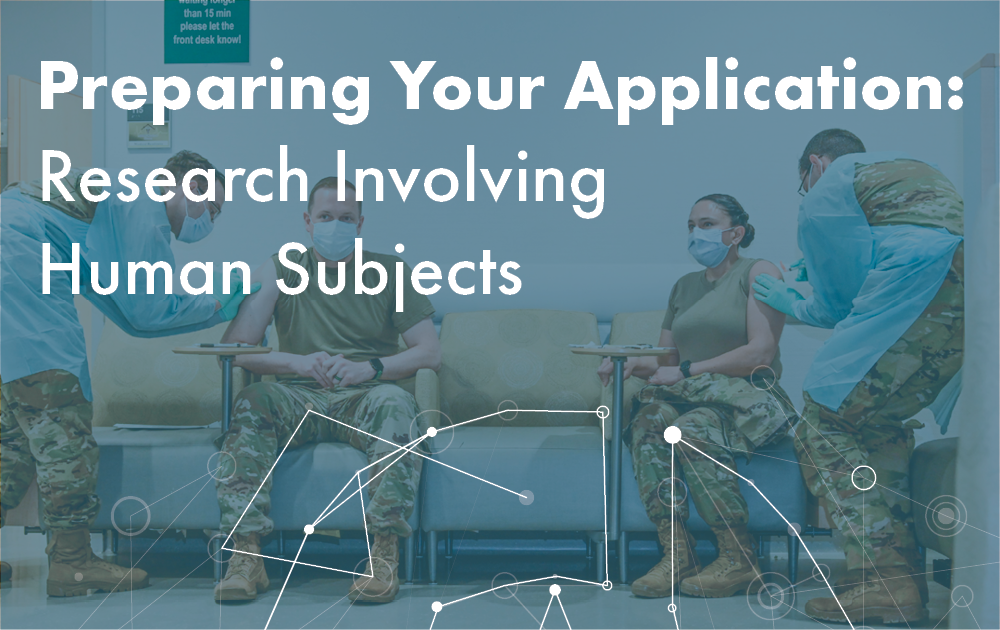12 December 2022
Part 6 — Preparing Your Application: Research Involving Human Subjects
This is part 6 of 8 in the Generate a Winning Research Proposal Learning Series. Click here to download the whole series.
Is my study “research involving human subjects”?
Not all work involving human subjects is considered research. On the other hand, even if the project consists solely of work in the lab, some lab work that studies human samples qualifies as research involving human subjects. Determining whether your project is “research involving human subjects” is an important step to ensure that the study is conducted in compliance with the applicable rules and regulations and that you prepare all of the information necessary for your application.
Study protocols for research involving human subjects must be reviewed and approved by your institution’s Institutional Review Board (IRB) to ensure that activities will be executed in a manner that is ethical and that respects the rights and welfare of human participants. The IRB will also determine whether informed consent or the documentation of informed consent is required or can be waived.
NIH provides a helpful decision tool to help determine whether your project would be considered “research involving human subjects” and whether or not it might be exempt from Federal Regulations. A decision tree is also available from the HHS*. For studies where the approaches may make these decisions less clear, you will want to discuss your study protocol with your institution’s IRB to determine whether your research would be considered “research involving human subjects.” Geneva is happy to assist you and help clarify your project.
What does the IRB review and what is “informed consent”?
The IRB is a committee made up of a diverse, independent group of scientists, physicians, and non-scientists whose purpose is to review research involving human subjects to ensure that the rights and well-being of potential research subjects are adequately protected. All activity considered research involving human subjects must undergo review by the IRB. This includes review of the study protocol and the informed consent form (ICF). Some research studies may be “exempt” if they involve very minimal or no risk. For example, some research that involves secondary analysis of data collected from human subjects with no identifiable information could be exempt. Exempt studies must still be initially reviewed and approved by the IRB, but annual reviews will not be required unless there are changes in the protocol. Use the decision tool if you believe your study qualifies for exempt status and a request for exemption can be submitted to the IRB for review for your study.
The ICF is a regulatory document provided to potential study volunteers that describes the study in such a way that they can make an informed decision about the risks and benefits to participating in the study. When conducting research involving human subjects, its necessary to determine whether you must obtain informed consent from the study participants for the protection of human subjects in research. As stated previously, research involving human subjects must be reviewed by the institution’s IRB and in addition, a determination must be made on whether informed consent or the documentation of informed consent is required or can be waived.
- Human Research Protection Training (offered by the HHS Office for Human Research Protections)
- HHS Human Research Protection Program Resources
Decision Trees
*Decision Trees published by the U.S. Department of Health and Human Services (HHS) assist in making determinations for exempt research. As noted in their charts, the HHS decision trees and charts may not reflect the requirements imposed by other organizations. To ensure compliance, check the requirements of the sponsor agency/organization first.
- NIH definition of Human Subjects Research, tools, and resources
- NIH Decision Tool: Is your study research involving human subjects?
- HHS Decision Trees policy charts
Is my research study a clinical trial?
The next step in planning is to determine whether your research involving human subjects is considered a clinical trial.
NIH defines a clinical trial as “a research study in which one or more human subjects are prospectively assigned to one or more interventions (which may include placebo or other control) to evaluate the effects of those interventions on health-related biomedical or behavioral outcomes.”
For some research studies, making the determination that it meets the definition for a clinical trial is straightforward, but for others, it can be more nuanced. NIH has decision tools, case studies, and various resources that clarify the NIH definition and criteria of a clinical trial.
- NIH’s definition of a clinical trial and additional resources
- NIH Clinical Trial Decision Tool: help determine whether you are planning a clinical trial
- NIH Case Study examples for clinical trial determinations
How does this affect my proposal application?
Funding agencies explicitly state what kind of research studies are allowed for certain awards. These and other sponsors may choose to release separate awards for research projects that involve a clinical trial and designate different opportunities for research that involves human subjects, basic research, or translational research. Submitting a clinical trial project to a funding opportunity that does not allow them will result in your application being considered “non-responsive” and returned without review.
In addition to funding opportunity restrictions, additional documents detailing the protocol and the anticipated subject pool will be required in proposals that include research involving human subjects. Geneva can provide templates and guidance on the necessary proposal application documents once it is determined that your project includes human subjects and/or is a clinical trial. IRB approval is not required prior to submitting your proposal. However, you may wish to consult with your IRB or other experts in research involving human subjects to ensure the proposal addresses all of the requirements.
The study protocol must have IRB approval prior to beginning any work on the project.
Please contact research@genevaUSA.org if you have any questions regarding the content of this publication or would like to find out more information on Geneva’s research services.



